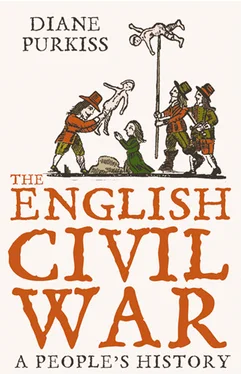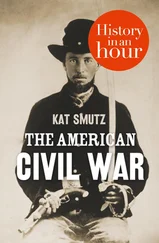The ceremony of childbirth was a women’s affair. Birth took place in a room from which all light was excluded; most air too. Only women could be present, and the labouring woman’s mother was usually with them. All the women, including the one giving birth, drank caudles, often a kind of eggnog with milk, wine and spices. But there was no anaesthesia available, and births did go catastrophically wrong from time to time.
After the birth, the woman remained in the birthing room for ten days, lying on the same linens on which she had delivered. After this time had elapsed, her ‘upsitting’ occurred; the linen was changed and she sat up and could show off the baby to its father and to other male visitors. But she and in particular the baby traditionally did not leave the home until a month had passed, during which time she would if reasonably off be cared for by a lying-in maid. At the end of the month, she and the baby would go to church for the churching ceremony, though a godly woman like Brilliana Harley might well find the ceremony offensive. Women from lower social strata would then feed their babies themselves. Some better-off women expressed the wish to do so but were sometimes forbidden by their husbands. The frequent remedies for sore and dry breasts in early modern commonplace books suggest that the process was not trouble-free, certainly not pain-free.
Historians used to think – rather arrogantly – that parents in earlier periods minded less about the deaths of children because such tragedies were much more frequent. Recent research strongly suggests that this was not the case. If anything, children were even more valued then than they are today because they represented prosperity and hope for a better future economically. And Brilliana, who certainly didn’t need her children’s labour, nonetheless adored her eldest son Edward, whom she called Ned. It was Ned who was the centre of her emotional life, not his father Robert. Brilliana sometimes asked Ned to tell Robert things or to ask him for things, but she also relied on him directly for love and comfort.
Brilliana’s other emotional centre was her religion. She was a very godly woman, alert and curious within a framework of strong, severe Calvinism. For Brilliana faith, good works and respect for God are not the means to salvation, but outward signs of election. From the beginning of time, God knows exactly who will ultimately join him in heaven, and who will be damned. This cannot be changed. Free will does not exist. So Brilliana wrote in her commonplace book that ‘man can not move it [his will] once to goodness, for moving is the beginning of turning to God … It is God that first turns our will to that which is good and we are converted by the power of God only, it is God that works in all of us.’ This could make life very difficult, for godly people were prone to terrifying bouts of introspection, examining themselves for signs that their faith was adequate enough for election. This was made all the more troubling because even those who were not truly elected could show some signs of faith; Brilliana, quoting directly from Calvin, wrote that ‘those that are not elect have some signs of calling, as the elect have, but they never cleave to Christ with that assurance of heart with which the assurance of our election is established, they depart from the church because they are not of the church’.
One of Brilliana’s servants, Blechly, decided that she was not saved in May 1640: ‘[and] has these 2 days been in grievous distress, and is in grievous agony of conscience and despair; she says she shall be damned’. Brilliana urges Ned to ask his tutor to pray for Blechly. Doubt and despair could themselves be outward signs that one was not a member of the elect, which made them even more terrifying. At the same time, complacency was a bad sign as well, so those cast temporarily into despair could revive themselves and experience a new birth of faith. Brilliana reminded Ned of the need for self-examination.
The Harleys made sure the vicar of their local church at Brampton was of their kind. At the end of the 1630s a man called Stanley Gower was the incumbent; on arrival in 1634 he had set about overlooking those regulations of the Laudian Church offensive to the godly. He wouldn’t let his parishioners stand during the gospel, nor bow at the name of Jesus; he left the absolution out of the prayer book’s service, he refused to rail the altar, still treating it as a movable communion table, and he told his congregation not to kneel in prayer, and not to remove their hats.
Robert Harley was part of the godly power network that was eventually to ensnare the king. He was accused of allowing Gower’s offences, harbouring Richard Symonds, a radical separatist who was also his son’s tutor, and creating special fasts for his own household, usually a sign of radical Puritanism. Harley was also in touch with that godly powerhouse and eminence grise Lord Saye and Sele, a distant cousin, and with his son Nathaniel Fiennes, with whom he exchanged godly books. He was also in contact with Prynne and Burton, visiting Prynne during his imprisonment, and sometimes meeting Burton bound on the same errand. It was Harley who moved at the start of the Long Parliament that all three should be invited to put their case to Parliament, which found in their favour and offered them compensation. During the Short Parliament, Robert Harley urged that bowing to the altar was idolatrous, and, with Pym, wanted it named a crime. At the same time, Brilliana disliked independents like the Brownists; she would not have seen eye to eye with Anna Trapnel. What she and Robert wanted was not innovation, but the retention and modest extension of what she saw as the normal practices of the Calvinist Elizabethan Church.
The Harleys saw the events of the 1620s and ’30s as a sign that the final struggle between the people of God and the Antichrist had begun. Brilliana wrote to Ned that ‘this year 1639 is the year in which many are of the opinion that the antichrist must begin to fall. The Lord say amen to it.’ The Harleys firmly believed in a sophisticated conspiracy of Catholics who manipulated Charles and would eventually convert him. It was against this background that news of the Ulster Uprising broke in November 1641. The belief that the same things could happen at any moment in England was fuelled when a tailor named Beale claimed on 15 November that he had overheard a design to kill 108 MPs, followed by a general Catholic rising. Robert Harley promptly wrote to John Aston: ‘look well to your town, for the Papists are discovered to have a bloody design, in general, as well as against the kingdom, as elsewhere’. At Brampton they were all in arms in the castle, ‘and took up provisions with them there in great fear’, wrote Brilliana.
To keep abreast of the ‘real’ news, suppressed by the government, the Harleys tried to get hold of printed news-sheets called corantoes and of manuscript news-sheets, called separates, which reported such events as speeches in Parliament and state trials. Sixteen-year-old Ned kept Brilliana supplied with separates during the Short Parliament. But personal letters were still the main source of news. The risk that they might be intercepted encouraged writers to be circumspect, however. Brilliana warned Ned about this risk: ‘when you write by the carrier, write nothing but what any may see, for many times the letters miscarry’. Some letter-writers used codes (Charles was especially fond of them). But the practice increased both paranoia and a sense that one was surrounded by spies and foes, plotting. Brilliana was delighted to hear of the abolition of the Court of High Commission, which had been the instrument of silencing many godly ministers, but not everyone in Herefordshire or the Marches was equally delighted to see godliness return. Brampton’s own vicar, Gower, reported glumly that ‘the vulgar comfort themselves with assured confidence that the bishops will get up again. I tell you but the language of Babel’s bricklayers’, while Thomas Harley, in Brampton, reported to his brother Ned in London that ‘some men jeer and cast forth reproachful words against the Parliament, and others that might forward the work of the Parliament are very backward’.
Читать дальше












